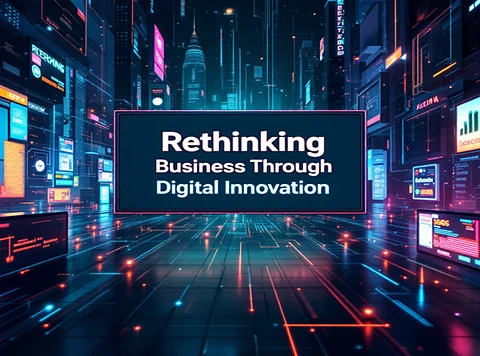

In today's fast-paced technological world, the imperative to transform is no longer optional—it's existential. Kiran Kumar Lekkala, a researcher and academician, offers a nuanced perspective on digital transformation by exploring its strategic dimensions and highlighting its core innovations.
Digital transformation isn't just about installing new software or upgrading infrastructure—it's about reimagining how organizations operate, compete, and deliver value. Businesses today are moving from reactive technology adoption to strategic overhauls that redefine operations. The most successful organizations aren’t just using technology but embedding it into every process, product, and decision-making layer. The goal isn’t to digitize current systems but to evolve them entirely.
One central pillar of this evolution is business process transformation. Organizations are not simply automating existing workflows; they are redesigning them from the ground up using digital tools. This includes integrating data-driven insights, cross-functional team dynamics, and a culture that embraces experimentation. By rethinking traditional workflows, firms are experiencing notable increases in efficiency and agility, traits essential for survival in volatile markets.
Digital tools are reshaping value creation. Companies are transitioning from traditional product models to service-oriented and platform-based ecosystems. These new structures allow for scalable, flexible, and customer-centric offerings that were previously unattainable. By shifting to subscriptions and outcomes-based pricing models, businesses are not just improving profitability—they’re redefining industry standards.
Perhaps the most profound insight is that culture, not just code, determines success. Many organizations underestimate the importance of cultural alignment in transformation efforts. Leaders often believe their companies are digitally mature, but disconnecting employees' perspectives can undermine initiatives. Embedding a digital mindset across all workforce levels—fostering collaboration, agility, and innovation—is a more significant challenge than implementing any single technology.
Digital transformation brings tangible strategic benefits. Real-time analytics have enhanced decision-making, making it faster and more informed. Organizations leveraging enterprise-wide data frameworks see improvements not only in operational agility but also in customer satisfaction. By enabling more intelligent resource allocation and process optimization, they can operate leaner while delivering superior results.
Customer-centric innovation is becoming a hallmark of successful transformation. Businesses can now offer personalized and seamless customer journeys through advanced analytics and AI-powered platforms. These improvements go beyond engagement, directly influencing business outcomes like conversion rates, retention, and profitability.
The transformation journey empowers companies to venture into uncharted market territories through digital platforms and outcome-based revenue models. These innovative approaches enable firms to shift from transactional to value-driven engagements, fostering predictable revenue streams, improved customer retention, and enhanced market competitiveness. Beyond financial benefits, this evolution represents a strategic leap, allowing organizations to scale efficiently, reduce capital intensity, and increase operational agility. Companies deliver more excellent value while optimizing resources by focusing on outcomes rather than outputs. This strategic repositioning drives sustainable growth, elevates brand equity, and attracts higher market valuations, redefining what success looks like in the digital era.
The true measure of transformation is resilience—the ability to withstand and adapt to disruption. Organizations that had already laid strong digital foundations were quicker to recover from market shocks and economic upheavals. Their agility enabled sustained growth, enhanced customer satisfaction, and reduced volatility. However, this resilience is not solely a product of advanced technology. It is deeply rooted in an adaptive organizational mindset that values continuous learning, innovation, and flexibility. By fostering a culture of experimentation and responsiveness, these organizations turn uncertainty into opportunity, making resilience a strategic advantage rather than a reactive necessity.
A compelling insight worth highlighting is the synergy between technology and culture. In the happiest circumstances, advanced software and infrastructure fall short in their utility unless they are embedded in a human culture. The essence of longevity will revolve around good communication, change management with inclusiveness, and leadership. These cultural elements ensure that technological tools are consumed into meaning and are not consumed mechanically. Organizations that follow through with tech investment geared toward empathetic leadership and engagement of the working population will nurture a culture that harbors innovation, resilience, and lasting performance. From there, it is an ever-rewarding experience that fast-tracks incremental advancements to exponential gains, in turn liberating the potential of human and digital capabilities.
To conclude, Kiran Kumar Lekkala provides a useful perspective for visualizing digital transformation as a journey of evolution rather than as a single completed IT project. As organizations continue to move through this complex landscape, how successful they will perform as organizations will be determined by their ability to integrate digital capabilities and cultural intelligence to develop agile, data-driven, and resilient organizations that are capable of whatever is next.
